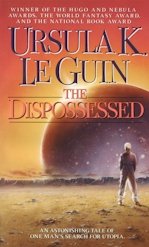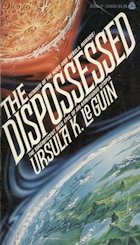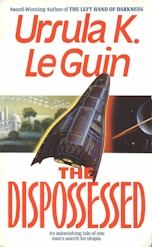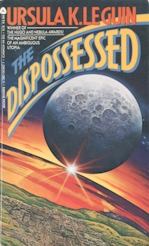
An Ambiguous Utopia (1974)
Winner of the Hugo and Nebula Awards
current Harper Prism paperback - 387 pages
cover art by Danilo Ducak (left)
1970s Avon paperback - 311 pages (right)

Denver Science Fiction & Fantasy Book Club |
 |
The Dispossessed: An Ambiguous Utopia (1974) Winner of the Hugo and Nebula Awards current Harper Prism paperback - 387 pages cover art by Danilo Ducak (left) 1970s Avon paperback - 311 pages (right) |

|
|
Amy's Summary:
Ursula K. Le Guin - The Dispossessed
The two planets Anarres and Urras are moons of each other, but there is little communication between them. This book tells of their different societies through the eyes of a physicist, Shevek. It shows how politics can get entwined with scientific discovery. Chapters alternate between the story of Shevek's life on Anarres, and his time on Urras as a guest of Ieu Eun University. Shevek's theory of temporal physics, which he wishes to share with all of humanity, will lead to the invention of the ansible, a device that permits communication without any time interval between two points in space, even if the points are light years apart. Annares is a dry, marginal world settled by anarchist followers of Odo who left Urras over a century and a half ago. The Anarresti have little government, no established religion, unique computer derived names, a created language, and few possessions. People are taught to not "egoize" and to condemn profiteering. Most want nothing to do with Urras. Annares is a mining colony of Urras. Urras is a lush, green world, more like our own. There are a number of separate countries, some at war. Shevek is in A-Io, which is a capitalist society where men and women are unequal in status, and there's a huge gap between the rich and the poor. The rich are decadently wealthy, and the poor are unemployed and holding demonstrations. summary written by misuly@aol.com |

|
The Dispossessed: |
 |
| Dan | 9 | Amy | 9 |
 |
10 Wow! Don't miss it 8-9 Highly recommended 7 Recommended 5-6 Mild recommendation 3-4 Take your chances 1-2 Below average; skip it 0 Get out the flamethrower! U Unfinishable or unreadable - Skipped or no rating given |
| Cheri | 9 | Barb | 9 | ||
| Aaron | - | Cynthia | 9 | ||
| Jackie | - | Ron | 10 |